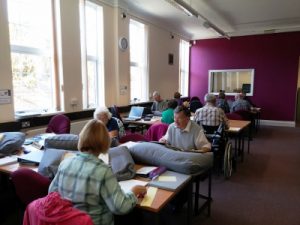On Tuesday 7th July Dorset History Centre reopened in a limited capacity following the Covid-19 lockdown. In this blog, we wanted to explain a bit more about how we reopened, our concerns and processes, some of the lessons learned from the first month of reopening; as well as examine how the service might look in the future.

Stage 1: Planning for the reopening
Reopening any service in this period has been challenging. With official guidance changing on a frequent basis, we had to plan accordingly. The first thing to do was to undertake a thorough risk assessment of our service. How did we operate, what could we continue to do, what would have to change? The risk assessment provided a clear insight into what procedures needed to be adapted or completely changed in order to facilitate safe access.
This generally fell into two categories:
- Procedures for staff
- Procedures for the general public
For staff, many things had to change. Constant application of hand-sanitiser has become the norm; but cleaning chairs and tables on a regular basis, cleaning lockers, as well as quarantining documents and books all now needed to be done. In addition, our previous our previous ‘open-door, drop-in service’ was no longer able to operate. Instead, bookable appointments in rigid time-slots had to be enforced to control the number of people entering our building at any time. With social-distancing regulations also came the reduction of staff on-site at any given time – further limiting what we were going to able to offer.
For the public, a long list of instructions was drawn up, including a request for a list of the documents they want to look at prior to their visit, how to behave in the search-room, and how to enter and exit the building; all of which were new things for our customers. Customers would also be asked to complete a track-and-trace form to ensure we would be able to contact them if needed.
We became aware of our limitations at this stage. With less staff we were unable to commit to supervising all of our public spaces in the same manner. This factor, coupled with concerns about members of the public touching communal surfaces, meant that we decided to close our Family History space. This would mean that there would be no access to computers or microform machines.
Our phone line would also have to remain un-staffed. Whilst voicemail messages would be responded to if left, all customers were encouraged to email us, meaning staff working from home could still respond to enquiries. Naturally, this would make the process somewhat slower for customers, but communal equipment such as telephones and computers were no longer to be used!
Our reprographics work would also be impacted by social-distancing regulations, and therefore we learned that orders may take longer than previously to be completed, both because of the time required to assess documents for copying, as well as the actual process of making the digital copies. In all cases, customer patience was requested as we learned a new way of working.

Step 2: Operating the reopening
Other things changed too. With reduced numbers available to visit on the days we were open, we were able to therefore spend a little more time helping those who were visiting. Prior to any visit, customers are in touch with us via email, at which point we ascertain their needs, what they wish to look at, and for what purpose. In a phone call between the customer and an Archivist 2-3 days before the visit, we were able to talk through these things and settle on a list of documents for the visit. During these phone calls, staff would advise on other sources that may not have previously been considered, and hopefully contribute to the research.
The first month of reopening has taught us some lessons about how to operate. We learnt about how to help the public evaluate their plans and what they were likely to achieve in 2.5 hours. Some people requested lots of documents but looked at only one or two. Some people only requested one or two, but could have looked at more. We would be doing no document-production on the day of the visit itself, so all items had to be pre-ordered, and as staff time on-site became more limited than before we have had to learn how to help people plan their research better to maximise their time!
We have also had to learn to be a little more forceful. Whilst the rules and regulations are sometimes difficult to observe, they have been put in place for everyone’s safety. So staff have learned to be clear in communicating these instructions to customers, and customers have had to learn to follow the rules we have set up.

Step 3: Planning for the future
We currently are operating on a two-day a week, four-customers per day approach. We hope to be able to increase both the number of days, and the number of customers in the future, but this depends on numerous factors, some beyond our control.
Our library is open, although books are quarantined for at least three days before they can be used by anyone else. However, our Family History room remains closed. We hope that in the future we can safely reopen this space in the future too!
As we move through the rest of 2020 and into 2021 it is hoped that our service can return to something close to what it used to be!

Conclusions
Reopening a service such as Dorset History Centre in the new world following the outbreak and lockdown was always going to be challenging. Archives are very different spaces used in very different ways to museums or libraries, and we have had to be mindful of various considerations, to our customers, to our staff, and to our collections, to ensure that access is given in the safest way possible. As with everyone at this time, we are learning and adapting our approach all the time in light of new governmental advice, lessons learned as we go along, and what we feel we are able to do with our small team.
If you wish to visit DHC, or have any questions about access to records, please drop us an email: archives@dorsetcouncil.gov.uk and a member of the team will get in touch with you.
We would like to thank all our customers for their continued support and understanding during this period.

